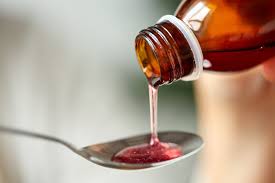The Indian maker of cough syrups used a dangerous industrial-grade component rather than the legal medicinal form, which Uzbekistan said last year had poisoned 19 children.
The company Marion Biotech purchased the component, propylene glycol (PG), from trader Maya Chemtech India. However, a source inside the company with knowledge of the Marion inquiry claimed that Maya “dealt in only industrial-grade materials” and lacked a license to sell pharmaceutical-grade materials.
The person, who wished to remain unnamed while the matter is being probed, stated, “We did not know Marion was going to use it to make cough syrups.” “Nowhere our material is used is disclosed to us.”
According to the two sources, the syrup was manufactured with industrial-grade PG, a poisonous substance that is frequently found in liquid detergents, antifreeze, paints or coatings, and pesticides to increase their potency.
A second source, an investigator, who asked to remain unnamed since the investigation is continuing, claimed that Marion “bought commercial-grade propylene glycol.”
The source continued, “They were supposed to take Indian Pharmacopoeia-grade,” alluding to regional specifications for the makeup of pharmaceuticals.
Additionally, according to the investigator, Marion did not test the component before utilizing it in the syrups it sold to Uzbekistan.
According to India’s drug and cosmetic regulations, it is the duty of producers to guarantee the safety of the substances they use.
The firm source claims that although Maya is not charged, the probe is still underway. Maya’s employer, the national capital territory of Delhi’s Assistant Drugs Controller, Deepak Sharma, declined to comment because the federal drug enforcement agency was looking into the situation.
Marion has previously denied any wrongdoing and claims to trade in pharmaceuticals, herbal, and cosmetic products. Requests for comment were not met by the corporation, India’s drug authority, or the health ministry.
According to a study conducted by the health ministry of Uzbekistan last year, the Marion cough syrups Ambronol and DOK-1 Max contained unsafe levels of the toxins diethylene glycol (DEG) and ethylene glycol (EG), which are used in non-food goods.
Four persons were detained in Uzbekistan in January in connection with the 19 deaths, including two executives of a business that imported the Marion medicines.
The health ministry of Uzbekistan did not respond to a query regarding potential sanctions there.
Experts in pharmaceutical manufacturing claim that DEG and EG have been substituted for propylene glycol by dishonest individuals since they are less expensive.
The World Health Organization stated earlier this month that its current working idea is that one or more vendors blended the less expensive dangerous liquids with the genuine chemical in 2021 when the price of propylene glycol skyrocketed.
When questioned about the ingredients used by Marion, a WHO spokeswoman responded, “It is important that product manufacturers only use appropriately qualified suppliers.”
The country’s drug controller stated in March that tests conducted in January by an Indian government laboratory revealed that 22 samples of syrup prepared in Marion were “adulterated and spurious.”
In March, Marion’s license was revoked by Uttar Pradesh authorities, where she currently resides. Police issued warrants for the arrest of two directors and three of its employees. According to Vijay Kumar, an officer with the Uttar Pradesh police department, the three workers have subsequently been released on bond.
One of them, operations director Tuhin Bhattacharya, claimed to have left Marion. The other two, chemists Mool Singh and Atul Rawat, as well as their attorneys, were not reachable.
The directors, Jaya Jain and Sachin Jain, were forbidden by the court from being detained unless they had been found guilty.
India’s pharmaceuticals authority instructed the nation’s pharmaceutical companies not to purchase PG from Maya in March.
STANDARDS In addition to the deaths in Uzbekistan, at least 70 children died in the Gambia last year after ingesting cough syrups prepared by a different business in India that were later discovered to be infected with the toxins, and more than 200 children died in Indonesia as a result of consuming contaminated cough syrups.
A global investigation of the pharmaceutical supply chain was launched in response to the deaths.
Only traces of EG and DEG are permitted by international regulations in pharmaceutical-grade propylene glycol. Limits are less strict for the industrial or commercial grade version because they are not meant to be consumed by people.
The other Indian company, Maiden Pharmaceuticals, supplied cough syrups that contained the poisons to the Gambia. Although Maiden has denied any wrongdoing, the WHO has linked these syrups to the deaths of the children.
The Gambia informed India’s drug regulator in June that starting on July 1 it would require all pharmaceutical products from India to be inspected and tested in India, at the exporter’s expense, prior to shipment. This is the first time that national exports have been subjected to known restrictions as a result of the deaths associated with syrups made in India.
Starting in June, India made it a requirement for businesses to test their cough syrups before export.

















